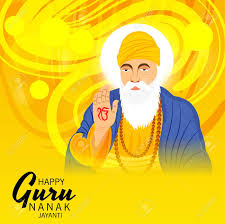GURUPURAB
On the eve of Gurupurab, let me express my deep regards for the philosophy of Guru Nanak Dev Ji. As I came to know about his life history I got more influenced by his principles/beliefs, because I am also not in favour of the rituals associated/developed with different religions.




History:
Who was Guru Nanak????
Well, he's well known as the founder of Sikhism.
But, do you know? He was born to a Hindu family as a kshetriya in the village of Talwandi, on the Indian subcontinent in 1469. Guru Nanak is said to have strongly reacted against the Hindu thread ceremony at the age of ten and rejected it. But that didn't mean that he didn't believe in the existence of God. He traveled worldwide in quest of religion vs. God. According to ancient stories, he achieved his enlightenment at the age of thirty. He declared himself as neither Hindu nor Muslim, but simply a follower of the path to God. After this point of time, he was recognised/ described as a Guru (one who dispels or removes ignorance or darkness 'gu', and brings enlightenment or light. 'ru').
Guru Nanak encouraged both Hindus and Muslims to perceive the truth which existed within themselves to reach God without the aid of intermediaries such as the Brahmins and Qazis who laid emphasis on rituals and superstitions.
Guru Nanak was a social reformer who was against caste system and who strongly supported women upliftment. Soon a body of believers in his compositions, The Japji, the Sofar and the Arati and meditation grew into a strong community, even though, he never said he was God. It was twenty days before his death on September 22, 1539 he appointed a successor, Guru Angad, who consolidated the beginnings of the Sikh religion by collecting Guru Nanak's poems and hymns into what is now the holy book of the Sikhs, the 'Adi Granth'.
The Japji Sahib is the first hymn in the Adi-Granth, the 1430-page book whose teachings are followed by 17 million Sikhs all over the world.

 Guru Nanak Dev Ji's birth is celebrated worldwide as Guru Nanak Gurpurab on Kartik Pooranmashi/the full moon day.
Guru Nanak Dev Ji's birth is celebrated worldwide as Guru Nanak Gurpurab on Kartik Pooranmashi/the full moon day.
Wish you all a happy Guru Nanak Jayanti, in advance.
ଗୁରୁ ନାନକଙ୍କ ୧୪୬୯ ମସିହାରେ, ଏକ ହିନ୍ଦୁ ପରିବାରରେ ଜନ୍ମଗ୍ରହଣ କରିଥିଲେ | କିନ୍ତୁ ତାଙ୍କୁ ଜାତି ଓ ଧର୍ମ ନାମରେ ପ୍ରଚଳିତ ପ୍ରଥାଗୁଡିକୁ ଆଦୌ ପସନ୍ଦ ନଥିଲା | ତେବେ ଏହାର ଅର୍ଥ ନୁହେଁ ଯେ ସେ ଭଗବାନଙ୍କୁ ମାନୁନଥିଲେ| ତାଙ୍କ ମତରେ, ଭଗବାନ ଏକ ଅଟନ୍ତି | ସେ କେବଳ ହିନ୍ଦୁଙ୍କର କିମ୍ବା ମୁସଲମାନଙ୍କର ଭିନ୍ନ ଭିନ୍ନ ନୁହନ୍ତି | ତାଙ୍କର ଜୀବନ କାଳରେ ସେ ଅନେକ ଯାଗାଗୁଡିକୁ ପରିଭ୍ରମଣ କରିବ ସହିତ ଭଗବାନଙ୍କ ପଥ ଅନୁସରଣ କରିଥିଲେ | ସମାଜର କୁପରମ୍ପରା ଓ ଅନ୍ଧ ବିଶ୍ଵାସ ବିରୁଦ୍ଧରେ ସ୍ଵର ଉତ୍ତୋଳନ କରି, ସମାଜର ମଙ୍ଗଳ ନିମନ୍ତେ ସଦାସର୍ବଦା କାର୍ଯ୍ୟକ୍ଷମ ଜାରି ରଖିଥିଲେ, ଗୁରୁ ନାନକ ଦେବ । ସେ ନିଜକୁ କେବେ ଭଗବାନ ବୋଲି କହିନଥିଲେ | କିନ୍ତୁ ତାଙ୍କ ପ୍ରଚଳିତ ନୀତି ଗୁଡିକୁ ନେଇ ଶିଖ୍ ଧର୍ମ ପ୍ରଚଳିତ ହେଇ ଆସୁଅଛି ।
ତାଙ୍କ ଜନ୍ମ (କାର୍ତ୍ତିକ ପୂର୍ଣ୍ଣିମା) ଦିନ ଟିକୁ ଗୁରୁ ନାନକ ଜୟନ୍ତୀ ରୂପେ ପାଳନ କରାଯାଏ ।






But, do you know? He was born to a Hindu family as a kshetriya in the village of Talwandi, on the Indian subcontinent in 1469. Guru Nanak is said to have strongly reacted against the Hindu thread ceremony at the age of ten and rejected it. But that didn't mean that he didn't believe in the existence of God. He traveled worldwide in quest of religion vs. God. According to ancient stories, he achieved his enlightenment at the age of thirty. He declared himself as neither Hindu nor Muslim, but simply a follower of the path to God. After this point of time, he was recognised/ described as a Guru (one who dispels or removes ignorance or darkness 'gu', and brings enlightenment or light. 'ru').
Guru Nanak encouraged both Hindus and Muslims to perceive the truth which existed within themselves to reach God without the aid of intermediaries such as the Brahmins and Qazis who laid emphasis on rituals and superstitions.
Guru Nanak was a social reformer who was against caste system and who strongly supported women upliftment. Soon a body of believers in his compositions, The Japji, the Sofar and the Arati and meditation grew into a strong community, even though, he never said he was God. It was twenty days before his death on September 22, 1539 he appointed a successor, Guru Angad, who consolidated the beginnings of the Sikh religion by collecting Guru Nanak's poems and hymns into what is now the holy book of the Sikhs, the 'Adi Granth'.
The Japji Sahib is the first hymn in the Adi-Granth, the 1430-page book whose teachings are followed by 17 million Sikhs all over the world.

 Guru Nanak Dev Ji's birth is celebrated worldwide as Guru Nanak Gurpurab on Kartik Pooranmashi/the full moon day.
Guru Nanak Dev Ji's birth is celebrated worldwide as Guru Nanak Gurpurab on Kartik Pooranmashi/the full moon day.Wish you all a happy Guru Nanak Jayanti, in advance.
ଗୁରୁ ନାନକ ଜୟନ୍ତୀ
ଗୁରୁ ନାନକଙ୍କ ୧୪୬୯ ମସିହାରେ, ଏକ ହିନ୍ଦୁ ପରିବାରରେ ଜନ୍ମଗ୍ରହଣ କରିଥିଲେ | କିନ୍ତୁ ତାଙ୍କୁ ଜାତି ଓ ଧର୍ମ ନାମରେ ପ୍ରଚଳିତ ପ୍ରଥାଗୁଡିକୁ ଆଦୌ ପସନ୍ଦ ନଥିଲା | ତେବେ ଏହାର ଅର୍ଥ ନୁହେଁ ଯେ ସେ ଭଗବାନଙ୍କୁ ମାନୁନଥିଲେ| ତାଙ୍କ ମତରେ, ଭଗବାନ ଏକ ଅଟନ୍ତି | ସେ କେବଳ ହିନ୍ଦୁଙ୍କର କିମ୍ବା ମୁସଲମାନଙ୍କର ଭିନ୍ନ ଭିନ୍ନ ନୁହନ୍ତି | ତାଙ୍କର ଜୀବନ କାଳରେ ସେ ଅନେକ ଯାଗାଗୁଡିକୁ ପରିଭ୍ରମଣ କରିବ ସହିତ ଭଗବାନଙ୍କ ପଥ ଅନୁସରଣ କରିଥିଲେ | ସମାଜର କୁପରମ୍ପରା ଓ ଅନ୍ଧ ବିଶ୍ଵାସ ବିରୁଦ୍ଧରେ ସ୍ଵର ଉତ୍ତୋଳନ କରି, ସମାଜର ମଙ୍ଗଳ ନିମନ୍ତେ ସଦାସର୍ବଦା କାର୍ଯ୍ୟକ୍ଷମ ଜାରି ରଖିଥିଲେ, ଗୁରୁ ନାନକ ଦେବ । ସେ ନିଜକୁ କେବେ ଭଗବାନ ବୋଲି କହିନଥିଲେ | କିନ୍ତୁ ତାଙ୍କ ପ୍ରଚଳିତ ନୀତି ଗୁଡିକୁ ନେଇ ଶିଖ୍ ଧର୍ମ ପ୍ରଚଳିତ ହେଇ ଆସୁଅଛି ।
ତାଙ୍କ ଜନ୍ମ (କାର୍ତ୍ତିକ ପୂର୍ଣ୍ଣିମା) ଦିନ ଟିକୁ ଗୁରୁ ନାନକ ଜୟନ୍ତୀ ରୂପେ ପାଳନ କରାଯାଏ ।





















Comments
Post a Comment